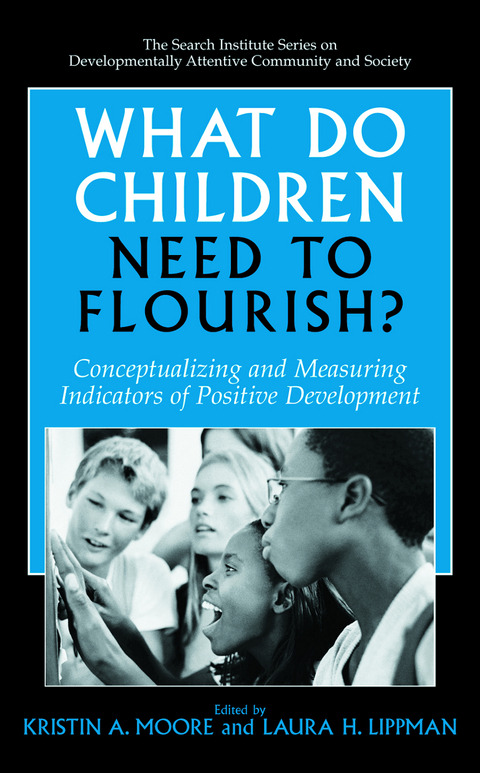
What Do Children Need to Flourish?
Springer-Verlag New York Inc.
978-0-387-23061-0 (ISBN)
- Titel z.Zt. nicht lieferbar
- Versandkostenfrei
- Auch auf Rechnung
- Artikel merken
Regardless of its validity, many adults share a belief that today’s youth face an inauspicious future. Drugs, sex, violence, disintegration of the nuclear family, technology that replaces interpersonal relationships—that’s what you hear in the news. The media, through its dramatization of the dangers and risks children confront and pose, have created a well-established image of disenfranchised, hostile, and often-destructive children and adolescents. This image ignores the many children who are thriving as well as the possibility of positive outcomes for children and youth.
With children comprising roughly 30% of the global population—almost 2 billion children worldwide—understanding exactly what leads children to grow into confident, caring, responsible adults is an issue that belongs at the forefront of every nation’s agenda. Increasingly, it is understood that we need not only to prevent negative outcomes but to promote positive outcomes.
What Do Children Need to Flourish? Conceptualizing and Measuring Indicators of Positive Development, part of the Search Series on Developmentally Attentive Community and Society, focuses on how scholars and practitioners can begin to build rigorous measures of the healthy behaviors and attitudes that result in positive outcomes for children and youth. The volume is presented in five parts:
- Introduction and conceptual framework.
- Positive formation of the self—character, values, spirituality, life satisfaction, hope, and ethnic identity.
- Healthy habits, positive behaviors, and time use.
- Positive relationships with parents and siblings.
- Positive attitudes and behaviors toward learning and school environments.
- Enacting positivevalues and behaviors in communities.
What Do Children Need to Flourish? Conceptualizing and Measuring Indicators of Positive Development is an important volume for researchers and practitioners—in fact, for anyone interested and involved in working with children and adolescents.
Complete mental health: An agenda for the 21st century.- and Conceptual Framework.- Positive Formation of the Self: Character, Attitudes, Spirituality, and Identity.- The Values in Action Inventory of Character Strengths for Youth.- Adolescent Spirituality.- Children’s Life Satisfaction.- Measuring Hope in Children.- The Ethnic Identity Scale.- Healthy Habits, Positive Behaviors, and Time Use.- Leisure Time Activities in Middle Childhood.- Healthy Habits among Adolescents: Sleep, Exercise, Diet, and Body Image.- Adolescent Participation in Organized Activities.- Positive Interpersonal and Intrapersonal Functioning: An Assessment of Measures among Adolescents.- A Scale of Positive Social Behaviors.- Positive Relationships with Parents and Siblings.- The Parent-Adolescent Relationship Scale.- Positive Indicators of Sibling Relationship Quality: The Sibling Inventory of Behavior.- Positive Attitudes and Behaviors toward Learning and School Environments.- The Patterns of Adaptive Learning Survey.- Ability Self-Perceptions and Subjective Task Values in Adolescents and Children.- Assessing Academic Self-Regulated Learning.- Identifying Adaptive Classrooms: Dimensions of the Classroom Social Environment.- Connection to School.- School Engagement.- Enacting Positive Values and Behaviors in Communities.- Community-Based Civic Engagement.- Prosocial Orientation and Community Service.- Frugality, Generosity, and Materialism in Children and Adolescents.
| Reihe/Serie | The Search Institute Series on Developmentally Attentive Community and Society ; 3 |
|---|---|
| Zusatzinfo | XIV, 390 p. 1 illus. |
| Verlagsort | New York, NY |
| Sprache | englisch |
| Maße | 170 x 250 mm |
| Themenwelt | Geisteswissenschaften ► Psychologie ► Entwicklungspsychologie |
| Medizin / Pharmazie ► Medizinische Fachgebiete ► Psychiatrie / Psychotherapie | |
| Studium ► Querschnittsbereiche ► Prävention / Gesundheitsförderung | |
| Sozialwissenschaften ► Soziologie | |
| ISBN-10 | 0-387-23061-0 / 0387230610 |
| ISBN-13 | 978-0-387-23061-0 / 9780387230610 |
| Zustand | Neuware |
| Informationen gemäß Produktsicherheitsverordnung (GPSR) | |
| Haben Sie eine Frage zum Produkt? |
aus dem Bereich


